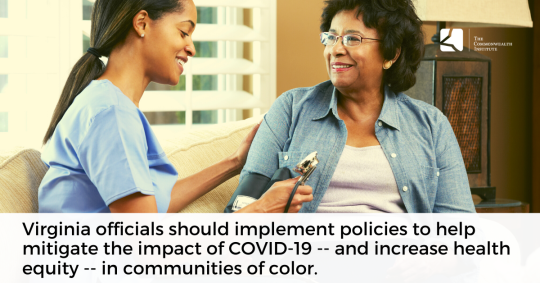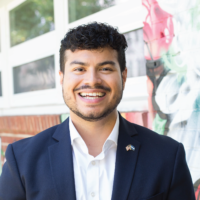June 10, 2020
If Not Now, When? Lawmakers Have Options to Advance Equitable Health Policies
The COVID-19 pandemic has put into sharp focus long-standing inequities in health care, paid leave, and economic opportunity in Virginia. As of June 10, 20% of confirmed COVID-19 cases with known race data are Black, while only 19% of people in Virginia identify as Black. Half of confirmed cases with known ethnicity data are Latinx, while only 10% of people in Virginia identify as Latinx. These statistics indicate that people of color are bearing the brunt of the COVID-19 pandemic.
Barriers to health care coverage are likely a contributing factor. In the most recently available data – which does not reflect the impact of Medicaid expansion – roughly 12% of all adults under the age of 65 were uninsured in Virginia. Yet when you look at the uninsured rate by race, we see that 32% of Latinx adults, 16% of American Indian adults, 15% of Black adults, 12% of adults identified as mixed race or “other” race, 9% of white adults, and 8% of Asian American adults lacked health insurance in 2018. Health care treatment is often expensive and people who are uninsured may be less likely to seek care or testing for fear of potentially high out-of-pocket costs, especially during this time of economic uncertainty for many. These inequities in health coverage could have contributed to the spread of COVID-19 in communities of color.
Past policy choices have created and maintained the barriers that have left many families of color in Virginia particularly at risk during the current crisis. Therefore, it will take many deliberate policy choices to dismantle the system of racism and undo the cumulative impact of historically exclusionary policies. There are some health care related policy options state officials can implement now to help mitigate the impact of COVID-19 – and increase health equity – in communities of color. These steps, in combination with other thoughtful, targeted investments, can ensure more people receive the care they need in the commonwealth.
Connect People to Testing and PPE in Low-Income Communities of Color
Free community testing sites should be made more available in low-income communities and be accessible without the need for a car. Lack of a vehicle in order to participate in drive-thru testing may be a deterrent and cause some to miss the opportunity to get tested. Furthermore, trusted community leaders need to be engaged in order to combat mistrust from communities that have been historically disenfranchised and may have had past negative experiences in medical settings due to racism. A history of medical experiments on people of color such as the infamous Tuskegee Study and similar U.S. led experiments in Guatemala have led to deep mistrust in many communities. Placing an emphasis on hiring and utilizing community health workers can help bridge that gap, connecting people to available resources.
And it is important that leaders follow through on their commitment to provide testing sites and times to communities that are reasonably accessible. That a Central Virginia testing event was cancelled on the day that it was scheduled to occur, and immediately following a weekend of protests in Richmond, comes across as punitive, even if that was not the intention. Such last-minute rescheduling also does not take into account that many people who would likely need to use these services may not have the ability to easily adjust work or child care schedules.
Virginia announced a pilot program to hand out personal protective equipment (PPE) in under-resourced communities. This program is vital for those who lack the resources to purchase PPE on their own, yet need to continue using public transportation, purchase groceries, and go to work. This program should be expanded throughout the state with a focus on communities that are at high risk of contracting the virus due to socioeconomic factors and densely populated living conditions.

Allowing Emergency Medicaid to Cover COVID-19 Related Services
There have been reports of undocumented immigrant communities – who are largely, but not exclusively Latinx – being strongly impacted by COVID-19. Uncertainty about the costs of COVID-19 related services could be a barrier to accessing care before it becomes a more serious health issue. Banned from accessing health coverage from Medicaid or the Affordable Care Act (ACA) individual health insurance marketplace, undocumented immigrants may be wary of large out-of-pocket costs when seeking coverage.
One way Virginia could meet the needs of the undocumented community would be for the state to determine COVID-19 services eligible for emergency Medicaid. The emergency Medicaid program is offered to people that would qualify for regular Medicaid but are ineligible due to immigration status. Services are usually limited to medical treatment required after the sudden onset of a medical emergency that places the individual’s health and bodily function in severe jeopardy, such as a heart attack or a broken bone. Offering COVID-19 services through this program is a measure that a few states – most recently Michigan – have already taken and may encourage more undocumented individuals to seek the services they need without fear of how they will pay for it. This clarification would allow a singular statewide message to be shared and leave no doubt as to health care costs related to COVID-19 for all families with low incomes.
Allocate Funding to Eliminate Barrier to Medicaid Coverage
There is also a rule currently in place in Virginia which creates an obstacle for lawfully present immigrants to access health coverage through Medicaid. In the commonwealth, lawfully present immigrants must establish a 40-quarter (10 year) work history, concurrent with the federal five-year requirement, before qualifying for Medicaid. Virginia is one of only six states that has this additional, longer requirement.
Language and funding to eliminate this barrier was included in the budget approved by the General Assembly in March. However, the funding has been “unallotted,” or paused, until it can be reconsidered during a future special session. The need to remove this barrier is more urgent than ever, and while it is still in effect there are individuals locked out of comprehensive coverage when they arguably need it most. Funding should be restored to this program as soon as possible in order to offer a health coverage option for people who chose to work, live, and build their lives in the state.
Collecting/Reporting Disaggregated Data
The state currently reports COVID-19 outcomes by race and by ethnicity. The race categories are “White”, “Black or African American”, and “Other”. The ethnicity categories are “Hispanic or Latino” and “Not Hispanic or Latino”. These categories are not representative of Virginia and do not allow researchers, advocates, and the general public to fully understand how the pandemic is affecting different communities. Asian Americans and Pacific Islanders, American Indians, and multiracial people are not disaggregated and are presumably in the “other” race category.
Additionally, many of the individuals who are categorized in the white race category may identify ethnically as Latinx/Hispanic. Due to Latinx/Hispanic largely being considered an ethnicity and not a race, on the CDC COVID-19 case report form, people who identify as Latinx/Hispanic are made to choose a race and then make their Latinx/Hispanic ethnicity known separately. About two-thirds (64%) of Latinx people in Virginia identify their race as white. This could inflate the infection numbers for the white category and downplay the outsized impacts of COVID-19 on communities of color.
Maryland releases state data by disaggregating Hispanic and Non-Hispanic racial categories, which gives the state a clearer picture of what communities are being affected. This method of reporting also solves the issue of white race data being inflated by those who also identify as Latinx. Localities within Virginia, such as Fairfax County, are already using these categories when reporting COVID-19 outcomes. The state as a whole should follow these examples in order to better understand and respond to the pandemic as we continue steps to “reopen” businesses and activities throughout the state.
Fully Funding and Strengthening Virginia’s Medicaid Program
Medicaid is a crucial safety net program offering affordable and comprehensive health coverage. As of May 20, almost 30,000 adults had enrolled in Medicaid during the public health emergency under expanded eligibility, which is likely a result of people experiencing reduced or complete loss of income and employer health coverage. Roughly 53% of people losing employer-sponsored coverage in Virginia are expected to get coverage through Medicaid. The decision to expand Medicaid in 2018 has allowed Virginia to be better prepared for this moment. While 23% of those who lose employer coverage in Virginia are expected to go uninsured, 40% are expected to go uninsured in states that have not expanded Medicaid.
Nationally, Medicaid expansion has been proven to contribute to greater health equity, providing access to health care coverage and services for many in the Black and Latinx communities. We still do not fully know the racial health equity impact that Medicaid expansion has had on coverage access here in Virginia due to a lag in data reporting. We do know, however, that at the time of expansion at least 123,000 people of color who were previously uninsured likely became newly eligible.
In response to state budget concerns, some states are making cuts to their Medicaid programs. Virginia should not follow this example. Doing so could undo any progress made in health equity due to Medicaid expansion and deepen disparities in health outcomes for communities of color. Instead, Virginia should invest in strengthening Medicaid by funding efforts to provide coverage for a full year postpartum rather than the current 60 days and provide adult dental coverage. These policies had been included in the General Assembly-approved budget prior to being “unallotted” and will be reconsidered during a later special session.
Implementing a State Paid Family & Medical Leave Program
In response to the COVID-19 pandemic, the federal government implemented a paid sick program and a paid child care leave program through the Families First Coronavirus Response Act (FFCRA), but this legislation left out people working for large businesses (500 or more employees) and the Secretary of Labor has authority to exclude health care workers, emergency responders, and smaller businesses (fewer than 50 employees) that apply for an exemption. We need a permanent, more equitable, and comprehensive state paid family and medical leave program in Virginia.
Lack of access to paid family and medical leave prevents many working people from taking time off to care for themselves and their loved ones. This may result in the need to put off accessing needed health care services, which may further complicate existing health issues. Prior to the leave programs introduced in the FFCRA only 11% of the lowest-wage workers in Virginia had access to paid long-term medical leave.
Access to paid leave is crucial for families with low wealth who may not have the resources to take extended unpaid time off. The status quo forces too many working people to choose between their health or taking care of a loved one and paying for essentials like rent and food. No one should be forced to make that decision.
The COVID-19 pandemic has underscored the ways exclusionary policies impact the health outcomes of communities of color. This unfortunate reminder gives state policymakers an opportunity to invest in programs that will mitigate the impact of COVID-19 and lay the groundwork for a more equitable Virginia. State lawmakers should make public policy choices with the health, lives, and futures of communities in color in mind.
Category:
Health Care
